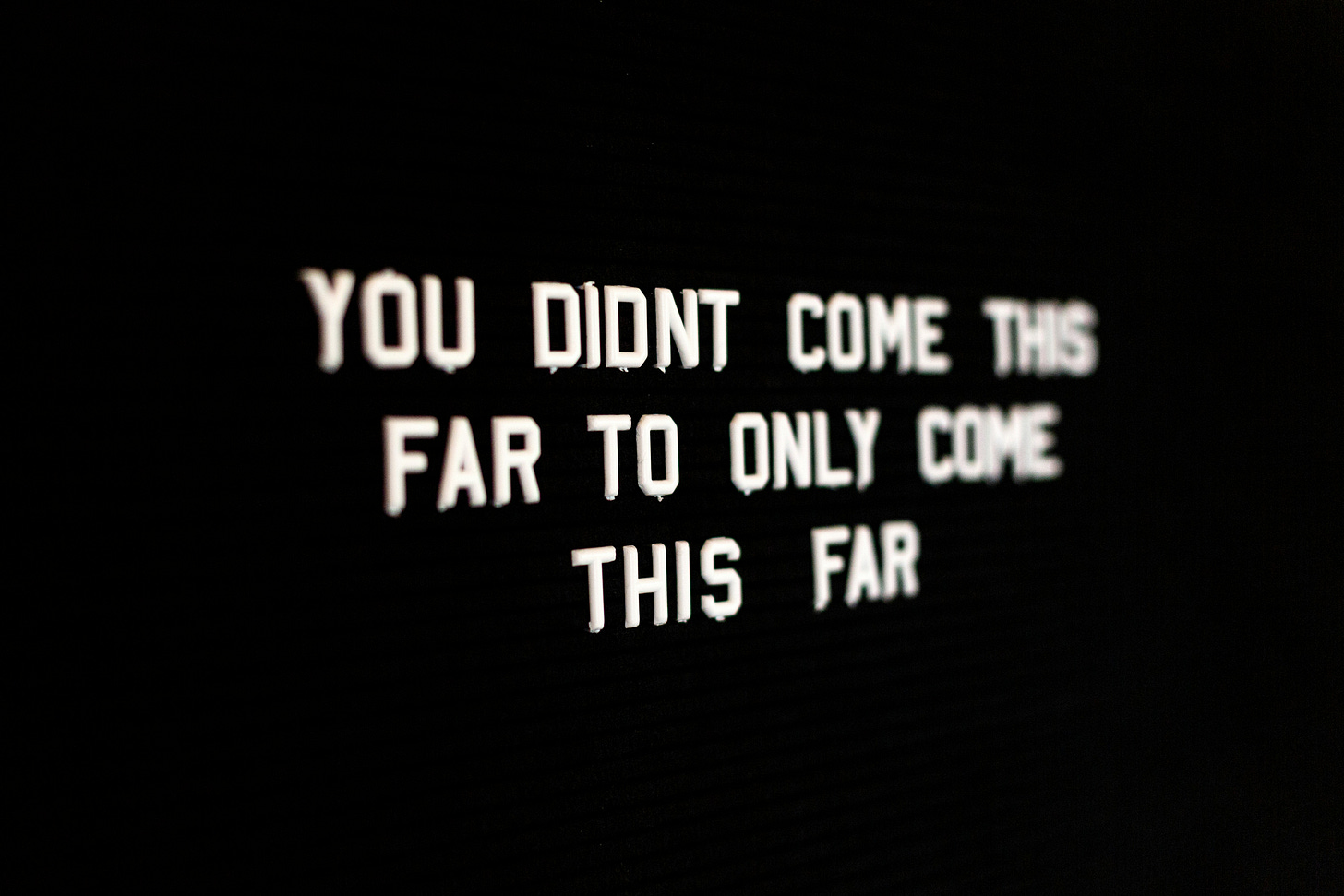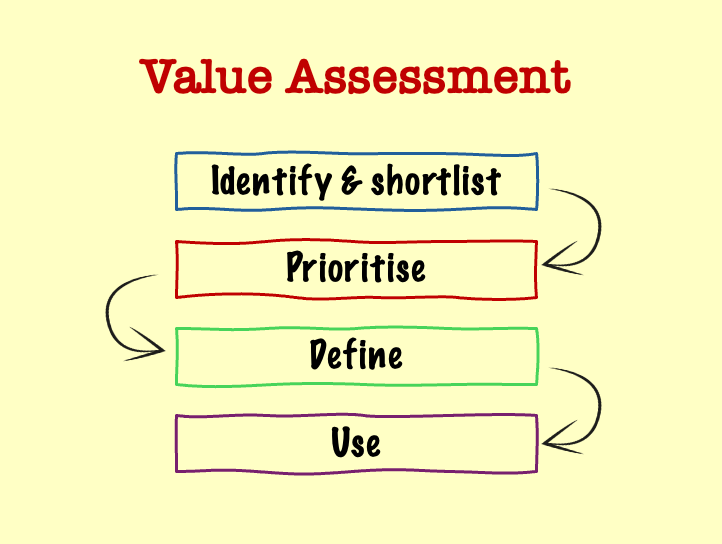How To Identify and Use Your Core Values
A practical guide + I share a database of 200+ values
What are your core values?
Your core values are your beliefs that guide your choices, actions, and priorities in life. Identifying your core values brings a sense of safety and stability into your life because you know what you want and what’s important to you.
I have come across many people over the past year who had some self-awareness of their values, but never really assessed them thoroughly. Some had never consciously thought about their values at all.
Our routine at work and home holds us back from spending more time towards self-reflection, self-talk and self-understanding.
Something had to change.
So I came up with a Value Assessment which takes about an hour to help you identify and prioritise your core values. Whether you are in your 20s just starting your work-life or in your 40s looking to get more out of your career, this assessment works for all.
Some basics first…
Why do your Core Values matter?
Understanding which values are most foundational to you clarifies decision-making and helps ensure alignment between your actions and what matters most.
Recognising your values provides a strong foundation for self-understanding and making choices aligned with what truly matters to you.
They guide your choices and actions, forming the foundation for an authentic and impactful career.
Decisions aligning with your deepest values lead to greater fulfilment, sustainable success, and clarity in complex situations.
#1 Understanding and identifying your values
Before assessing your values, I suggest you consider these categories. These categories can possibly overlap and that’s okay.
Lived values: These are your firm beliefs which have mostly been engrained since childhood. You often feel these values in your gut.
Admired values: These are the ones you see in others or that society promotes. You may not firmly believe in these but use these to protect your actions.
Aspired values: These are the ones you like to manifest strongly.
This process of identification will bring out the core values that shape your actions, crate a sense of purpose, and guide you towards a more fulfilling career.
Let’s get started!
1a. Read through the list of potential values that I have created. This is a list of more than 200 values carefully organised under various sub-categories.
1b. Pick all values that resonate with you. These can be the ones from the above three categories. (Tip: You don’t have to necessarily split your list of values across these categories). Write these down.
1c. As the list I shared is a generic one, also think of any other values that you wish to add here.
1d. Ensure you have narrowed down the list to 10 values for this exercise. This is, in most cases, the most tricky part of the assessment, so take your time to shortlist the top 10. When in doubt, seek help of the above categories to ask yourself which ones can you relate to most.
This assessment is only for yourself. Honesty is critical at this stage.
#2 Prioritising your values
You now have a list of 10 values that you can relate to the most. Time for some deep reflection.
Ask yourself the below questions against each value. Using these questions, you can start prioritising the values between 1 and 10.
Does this value feel essential to who you are as a person?
Does this value guide your most important decisions?
Do you feel conflicted about compromising this value?
Do I care about this value the most?
Which value gives you the strongest sense of purpose and fulfilment?
If forced to make a difficult choice, which value could you not live without?
The intent here is to rank each of the 10 values.
Once done, the rest of your assessment will focus on the top 5.
#3 Defining your core values
Now that you have identified and prioritised your values, you have a set of top 5 core values. It is time to define what they really mean to you in your own words.
For example, with my value “freedom,” there are many ways to define it. Here is how I define it versus how one of my coaching clients defines it:
Freedom (my definition): Ability to do whatever I want, whenever I want, and however I want it. This applies at the macro level (e.g., travel plans) and micro level (e.g., emotional freedom).
Freedom (my client’s definition): I want to have independence in my actions and decision-making and not be micromanaged.
Same core value, but two different definitions.
You may be tempted to write long sentences for each of your core values to justify them. But try to keep your definition as short as possible. Just one succinct sentence will do.
As you work to define your values, don’t be influenced by others’ perspective on what they mean to you. When I declare that “happiness” is one of my values, sometimes people roll their eyes. “That’s an empty word,” they’ll say, or, “That’s too general.” But for me, this word has a crystal-clear definition: Happiness is the joy in the process of what you are doing.
Big words, but very personal definitions.
#4 Using your core values
Understanding your values is a powerful start. Translating them into intentional actions is where true transformation happens.
Start putting your definitions to test in the real world. Your 5 definitions should now take the front seat in your daily actions.
This is where you will really start to understand the power of knowing your values. Your core values help you take decisions. They guide you through the mundane and the important.
Here is an example of my value “family” in action:
If one of your values is “family,” that can help you make decisions regarding your career or where you’d like to live. If you get offered a job that would allow you to move closer to your parents, you can feel excited in taking it over one based across the country. If you’re wondering if you should quit your job that has poor work-life balance, you can do so confidently knowing it would give you more time to spend with your loved ones.
Let it be difficult at the start. Living with knowledge of your top values and actively letting these impact your day is bound to be new and challenging.
Don’t kick yourself if you come across a value not really being true to it’s definition. You may come across a value not really belonging in your top-5, so you will need to revisit the assessment. That’s okay.

I suggest my clients to revisit their core values every year. This way, you can make sure you are still true to your top-5 or maybe things have changed at work or in personal life which demands a re-assessment.
I hope this helps you kick-start your journey towards identifying your true values. If you have any questions about this assessment, do drop me a note.
Thank you for reading!
If you liked this post, please share with your colleagues and friends.
I coach overachievers and help them seek happiness at work.
To book a free coaching discovery call, click here.
If you are seeking free mentoring, find me on ADPList.
Or drop by on LinkedIn to say hi!
Always rooting for your success,
Zubin 👋




This is very helpful!